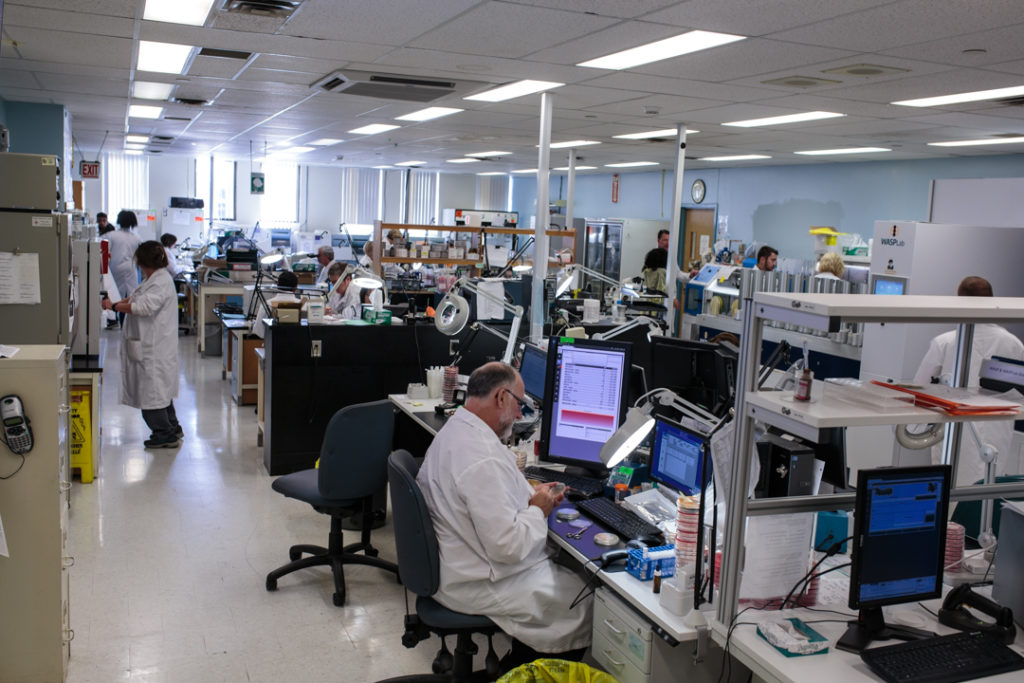
New Year, New Discoveries
Foreword by Katie Porter, director of research administration, Hamilton Health Sciences

A new year is a time to reflect on past accomplishments and make future plans.
Research at Hamilton Health Sciences (HHS) is wrapping up an eventful 2016 and embarking on new studies that will make an impact on our community in 2017.
From hosting successful international symposiums, to having our guidelines adopted by groups including the World Health Organization, to publishing multiple papers in the same issue of a prestigious journal, 2016 was a year that solidified Hamilton Health Sciences’ reputation as one of the most influential research communities in the world.
2017 will bring research in innovative areas including wearable technology and childhood mental health, and will even integrate dance as a potential way to reduce frailty in older adults.
In partnership with McMaster University, we’re proud that all of our institutes and centres are embarking on unique and exciting projects in the upcoming year.
Below, each group has shared their proudest moments from 2016, and what they are excited to accomplish this year. These examples demonstrate the tangible impact of research at HHS, and give us reason to look forward with enthusiasm to what 2017 will bring.
McMaster Autism Research Team
The McMaster Autism Research Team (MacART) is a partnership between McMaster Children’s Hospital, Hamilton Health Sciences, and McMaster University that aims to bridge the research-to-practice gap in Autism Spectrum Disorder (ASD).

This year MacART is excited to start the Pediatric Autism Research Collaborative (PARC) study together with clinicians at Ron Joyce Children’s Health Centre (RJCHC). This study will build an ASD Research Protocol, so we can collect data in partnership with clinicians over the course of a patient’s treatment. With this information, we can improve treatment for children in RJCHC’s Autism Spectrum Disorder Service.
In planning for this study, we integrated input from stakeholders, which we received during our inaugural Autism Research Stakeholder Symposium. This included insight from caregivers, clinicians, researchers and policy makers. The success of the symposium was our proudest accomplishment of 2016, and we look forward to the next edition in 2017!
Population Health Research Institute
2016 was a successful year for the Population Health Research Institute (PHRI).
The World Health Organization (WHO) adopted our training method for a global initiative to manage cardiovascular disease in developing countries, and we published 3 papers simultaneously in the New England Journal of Medicine from the HOPE-3 study on the benefits of using statins to lower blood pressure and prevent major cardiac events.
PHRI will conduct pilot studies of several research concepts in 2017, and continue with unique studies of: combination therapies, heart failure, perioperative medicine, birth cohort, renal and respiratory diseases, brain function and the global PURE studies of the environment and chronic disease.

Several new and ongoing projects will look into whether people with diabetes can achieve remission through a strict regimen of physical activity, diet and medication.
Patient engagement continues to be a growing area of focus for us, and we will be enhancing our efforts to prioritize this in all research projects that we undertake in 2017.
The Offord Centre for Child Studies
The Offord Centre for Child Studies is a multi‐disciplinary research institute. Studies conducted at the Offord Centre aim to improve the mental health and development of children and youth.
2017 will see results emerging from the recently completed 2014 Ontario Child Health Study (OCHS) – a sequel to the 1983 OCHS led by the late Dan Offord. The 1983 OCHS was the first large-scale general population study of child and youth health in Canada; it drew attention to high levels of child mental disorder in the population, the lack of treatment services for these disorders, and associations between disorder and socioeconomic disadvantage.
Co-led by Drs. Michael Boyle and Kathy Georgiades, the current OCHS is one of the Offord Centre’s defining projects. The investigative team is looking forward to examining changes between 1983 and 2017 in levels of child mental health need, responsiveness of health care services, and the impact of socio-economic disadvantage.
Geriatric Education and Research in Aging Sciences Centre
The Geriatric Education and Research in Aging Sciences Centre (GERAS) aims to transform the lives of older adults through research in frailty, falls, and fractures, and dementia and delirium. A recent example of this work is the development of evidence-based recommendations for preventing falls and fractures in long-term care, which informed the provincial Osteoporosis Strategy.
In 2016, GERAS members began a project to educate long-term care providers about this strategy, and how to effectively manage osteoporosis.
Still relatively new, GERAS is rapidly expanding its body of research. In 2017, members will undertake an innovative project called DANcing for Cognition & Exercise to examine frailty and dementia prevention by providing people at risk for dementia and frailty with a dance intervention.

GERAS will also be releasing results for TRIAGE, a study that included adults in the community over 70 years old, and examined strategies to reduce frailty, which has been shown to lead to adverse events like hospitalization and disability.
Thrombosis and Atherosclerosis Research Institute
The Thrombosis and Atherosclerosis Research Institute (TaARI) works in partnership with Hamilton Health Sciences to conduct research in thrombosis, atherosclerosis and cardiovascular disease to improve prevention and bring laboratory discoveries to the patient bedside.
They are the first guidelines focused on a rare disease that follow the rigorous GRADE methodology pioneered at McMaster University.
This past year, we made great strides in managing haemophilia, a hereditary bleeding disorder. Drs. Alfonso Iorio and Menaka Pai led the 2016 National Haemophilia-McMaster Guidelines on care models for haemophilia management. These guidelines are novel as they are the first guidelines focused on a rare disease that follow the rigorous GRADE methodology pioneered at McMaster University. They use novel methods of data analysis, which will improve haemophilia care in Canada and worldwide.
In 2017, we will publish the results of a large randomized trial on treatment of patients with deep-vein thrombosis (DVT) and clots in the lungs. The trial compares the effectiveness and safety of a blood thinner with the effectiveness and safety of aspirin. These results will have a tangible impact on extended treatment of patients with clots.
Escarpment Cancer Research Institute
The Escarpment Cancer Research Institute (ECRI) is anticipating the results of a trial aimed at improving patient convenience and quality of life for women who receive breast irradiation after breast conservation surgery will be available by the end of 2017.
This will have a significant benefit for thousands of women with breast cancer.
The OCOG RAPID trial compares large doses of daily radiation targeted to the tumor site over five days to standard whole breast irradiation that is given over a period of three to four weeks. Funded by the Canadian Institute for Health Research and led by Drs. Timothy Whelan and Ivo Olivotto, this study recruited 2000 participants from Canada and Australia and followed them for ten years. It is examining the recurrence of breast cancer in these women and any negative effects caused by the irradiation.
If the results show that shorter higher dose targeted radiation treatments have similar outcomes to longer whole breast irradiation, and aren’t associated with excess toxicity, this will have a significant benefit for thousands of women with breast cancer.
